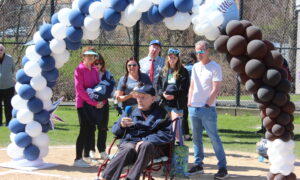Community and Law Enforcement Partnerships Increase Treatment Access, Recovery Support and Overdose Prevention Education
GLOUCESTER, Mass. (August 11, 2017) – Healthy Gloucester Collaborative (HGC), part of Gloucester Health Department, is a grant-funded coalition dedicated to promoting healthy communities by preventing and reducing substance use, is paving the way beyond Gloucester with partnership across Cape Ann, Beverly, Ipswich and Danvers to create a strong prevention regional network.  With community partners from law enforcement, local officials, community agencies and health providers to residents young and old, the partnership is focused to fight the opioid crisis from prevention of early misuse to saving lives and supporting recovery.
“With a shared commitment and purpose, our community partnership is moving prevention forward to new levels,†said HGC Director Joan Whitney, who underscored the breadth of partnership initiatives underway such as expanded capacity for opioid overdose workshops with participants ranging  from library staff to behavioral health professionals, outreach workers and pharmacists. Campaigns to fight stigma and reduce fear of calling 911 also a major regional initiative underway.   Highlighted  below are two  key examples of the innovative and collaborative energy of the Partnership.
“Our Place†— It’s OK to Come Home
Innovation is the cornerstone of Our Place, created by the HGC High Risk Task Force to meet the need for community-based support for residents returning home to their communities from detox and treatment. Â Our Place is designed to fit the capacity of small to medium-sized communities and enable offering a pro-social drug-free environments for residents who wish to maintain their path to recovery and a productive life.
“Our Place provides a safe space to encourage people in recovery to feel it is OK and safe to come back to their hometown with opportunity to avoid triggers of the past with healthy and stable supports to help move their lives forward at the pace they determine,†said Whitney. “Our Place provides participants a balance of experiences from personal exploration, serenity and friendship to yoga, job counseling and active engagement in peer-led activities.
“Our Place is the hope for communities to welcome those in recovery and provide them with a home,†said Paul Murphy, Our Place peer adviser. With Our Place’s success in Gloucester, the goal is to expand the model to willing partnership towns with a vision of ultimately creating a network of community based recovery support programs.
Treatment, Not Arrest
Law enforcement is driving collaborative solutions with the partnership of Gloucester, Cape Ann, Beverly, Ipswich and Danvers police departments. Supported by the regional grant opioid partnership led by HGC, Â and the shared desire to divert from arrest to treatment individuals struggling with mental health and/or substance use disorder, the departments, supported by the regional opioid grant led by HGC, are working hard to strengthen incident reporting, coordinate practices and resources, increase officer skills to better understand signs and symptoms if mental health and substance use disorder and de-escalate crisis situations.
Streamlining and strengthening service connections with key partners as Lahey Health Emergency Services, Eliot Human Services and the courts is a top priority as is the shared goal to embed a full-time clinician to increase “on site†referrals to treatment and assist follow-up calls for the departments.
“Mental health, substance abuse and so much more are issues that cross into all communities so we have to work together to address them,†said Mayor Sefatia Romeo Theken. “Partnerships are a necessity, not a choice, to save lives and help people get the help and services that everyone deserves.â€
“The suffering of those in substance use and/or mental health crisis response situations is felt by officers every day,†said Beverly Police Chief John LeLacheur. “Our partnership of North Shore Law Enforcement Crisis Intervention Teams (CTI) is committed to reducing this suffering by offering training to increase officer de-escalation and recognition tools and embed clinical capacity to divert arrests to direct access to treatment.â€
Gloucester Police Chief John McCarthy stressed, “Collaboration makes us each stronger and more able to deal with the extent of substance use and mental health situations we see as first responders. We are glad to work within our community to offer help for people in need.â€
For additional information on any of the above programs as well as other partnership initiatives, call Healthy Gloucester Collaborative at 978-281-0908.







